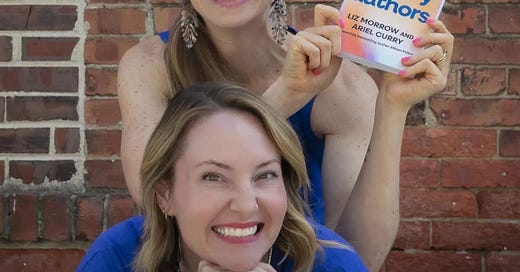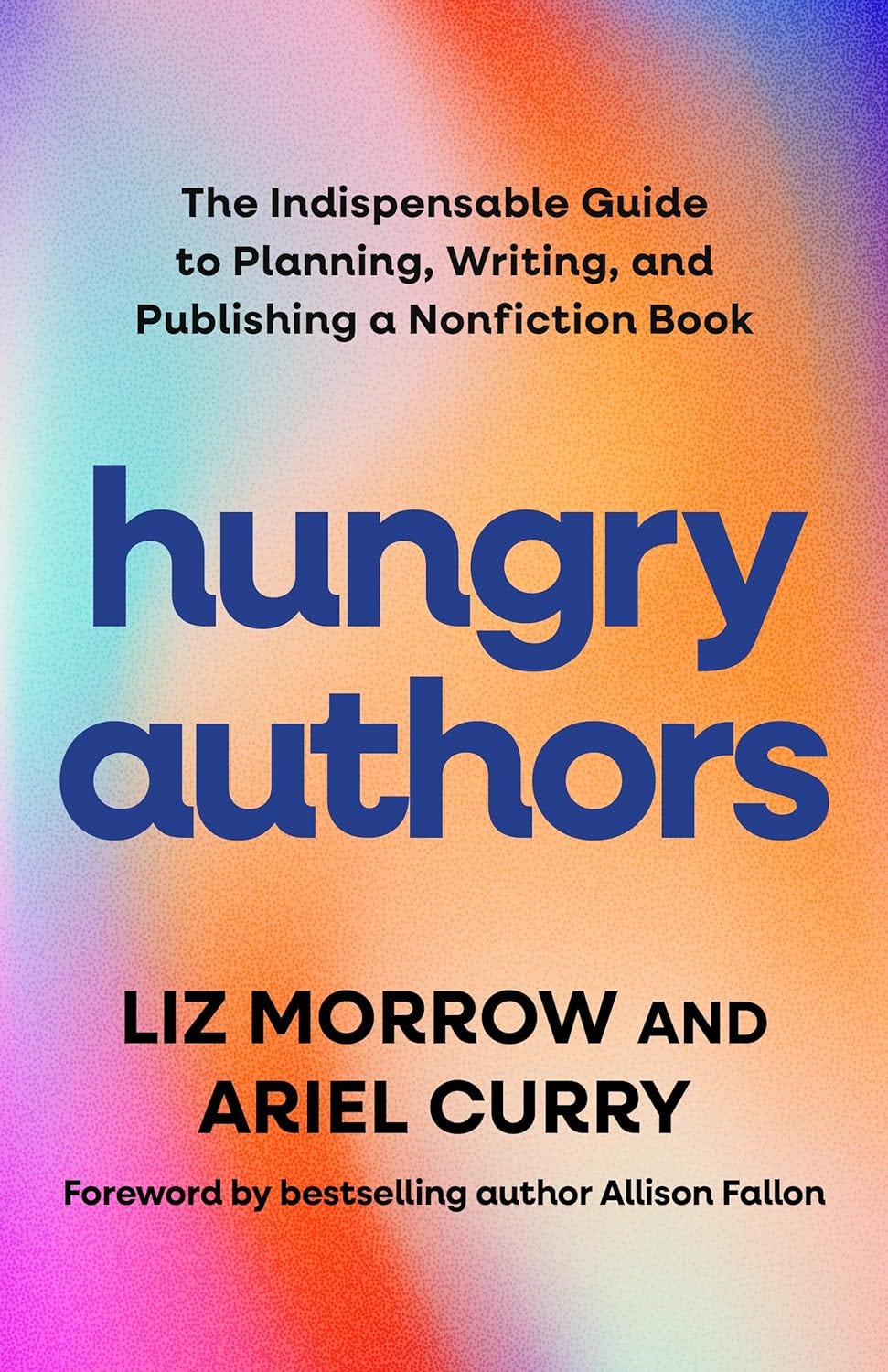One of the most important things new authors need to understand about publicity is that you never know where something will lead. Publicists make connections, but ultimately, the client has to forge a relationship. For example, who would have ever thought that Snoop Dogg and Martha Stewart would become besties?! It couldn’t have been planned, but their friendship was born from an initial connection.
That’s how the below interview came to be … I met Ariel Curry, co-author with Liz Morrow of the new book Hungry Authors: The Indispensable Guide to Planning, Writing, and Publishing a Nonfiction Book, because of pitching one of my clients to her Hungry Authors podcast. Ariel was a genuinely lovely person who was eager to help other authors! I’m honored and delighted to share some valuable information from their publishing journey and their work with authors in this newsletter. Enjoy!
What’s the one mistake you see authors make over and over?
Liz: Not planning their books! We are definitely planners, not pantsers. Most authors who start writing just based on the strength of their idea alone end up running out of steam at some point. My experience ghostwriting and collaborating taught me that you can write almost anything you want and not get stuck along the way if you map it out in advance. This is why we believe so passionately in the power of book mapping and teach an online cohort about it.
In your book you talk about the various forms of publishing: self, hybrid, and traditional. What made you decide to go with a traditional publisher and how long did the process take?
Ariel: We originally planned to go with a reputable hybrid publisher because we didn’t want to manage all of the steps ourselves (which we would have to do with self-publishing), and we didn’t necessarily want to wait 18+ months for a traditional publisher.
But ultimately, we both have the most experience with traditional publishing and we’ve both written many proposals that have been accepted at traditional publishers (even the Big 5!), so we thought, “Why not just try?” We faced a lot of rejections, as we expected, but ultimately Christen Karniski at Rowman & Littlefield took a chance on us, and we’re so grateful!
All told, from the time we signed the contract to the date our book was published, was 15 months. Not bad!
If someone reading this wants to traditionally publish, what should they know about what those publishers are looking for in authors?
Liz: We always say that there are three things you need to get published:
An audience
A great idea
Great writing
Publishers are looking for the best investments to make—and they need to be confident that they’ll get a return on their investment. If you have these three things, then it raises the chances of you have a successful book. And therefore, you’re a safer investment for publishers!
But here’s the catch. As my friend Lucinda Halpern says, you really only need two of these things.
You mentioned audience, so let’s talk about that dreaded word “platform.” This concept is so scary for authors, because it’s so hard to build an audience! Can you talk more about what platform means and what publisher are looking for?
Ariel: Absolutely! Platform is usually thought of in terms of social media numbers, and we’ve heard industry insiders saying things like, “You need at least 100,000 followers” or “You need 10,000 email subscribers.” But there are a few things you have to keep in mind about platform:
Your platform can be more than just social media! It could be your speaking engagements, articles in magazines, or membership organizations you’re part of. Anywhere that you have the ability to reach people with your message is part of your platform.
Different publishers expect different sized platforms. The Big 5 typically expect “bigger” platforms (but there’s no consensus on how big), while indie publishers will often publish authors with little to no platform.
Reader expectations differ by genre. Readers typically expect that prescriptive nonfiction authors will have more credibility and proof of concept (therefore, they need a bigger platform)--whereas memoir authors and fiction authors don’t need to have the same credibility already established.
Everyone thinks about platform differently! Every publishing professional has a different number in mind, so don’t worry if the person you meet isn’t the right fit. You are exactly what someone else is looking for.
What is a favorite failure or a failure that taught you the most and ultimately led to later success?
Liz: I worked with a client on her proposal—which was later accepted at a Big 5 publisher—but she didn’t sign me on to collaborate with her on the entire book. It felt like a massive rejection, especially after I had helped her land her dream book deal. For a while, this killed my confidence and made me doubt my skills as a collaborator. But that rejection gave me room in my schedule to take on a much bigger opportunity that soon came along, and now I’m working on some of my dream projects with dream clients!
Sometimes the rejection we fear actually gives us space to say yes to something greater.
What’s your biggest confession? Readers are sometimes shocked to find out something about an author. For example, some authors hate writing, others still hand write their manuscripts, others speak their entire book into an audio recorder and have it transcribed. What is it for you?
Ariel: I still get scared of the blank page and procrastinate. This is partly why I have so much more experience as an editor! I love jumping in and making something better—but starting from scratch, especially with my own ideas, is still nerve-wracking. As I’ve gained more experience, my confidence has grown, but there’s still this initial resistance I have to get over in order to start writing.
What are you currently curious about and spending time learning?
Liz: Writing fiction! Ariel and I are doing NaNoWriMo in November, and I’ve been inspired by Emily Henry’s romance novels to try my own. I’ve been obsessed with Lauren Kay’s resources for new fiction writers and I’m having so much fun getting ready to write in this genre.
Ariel: I have dreamed of having built-in bookshelves in my office for years, so lately I’ve been watching YouTube videos and planning what I want so that my husband and I can build them as a DIY project this fall!
Liz Morrow is an author, ghostwriter, collaborator, and thought partner for entrepreneurs, leaders, industry experts, and high-net-worth individuals. She has been writing professionally for over ten years, sold book proposals for multiple six figures, and published with “Big 5” publishers.
Ariel Curry is a senior editor for nonfiction at Sourcebooks with over 10 years of experience in traditional publishing. As an editor, she enjoys brainstorming and outlining new book ideas, bringing clarity and purpose to prose, and helping authors build their self-efficacy.





